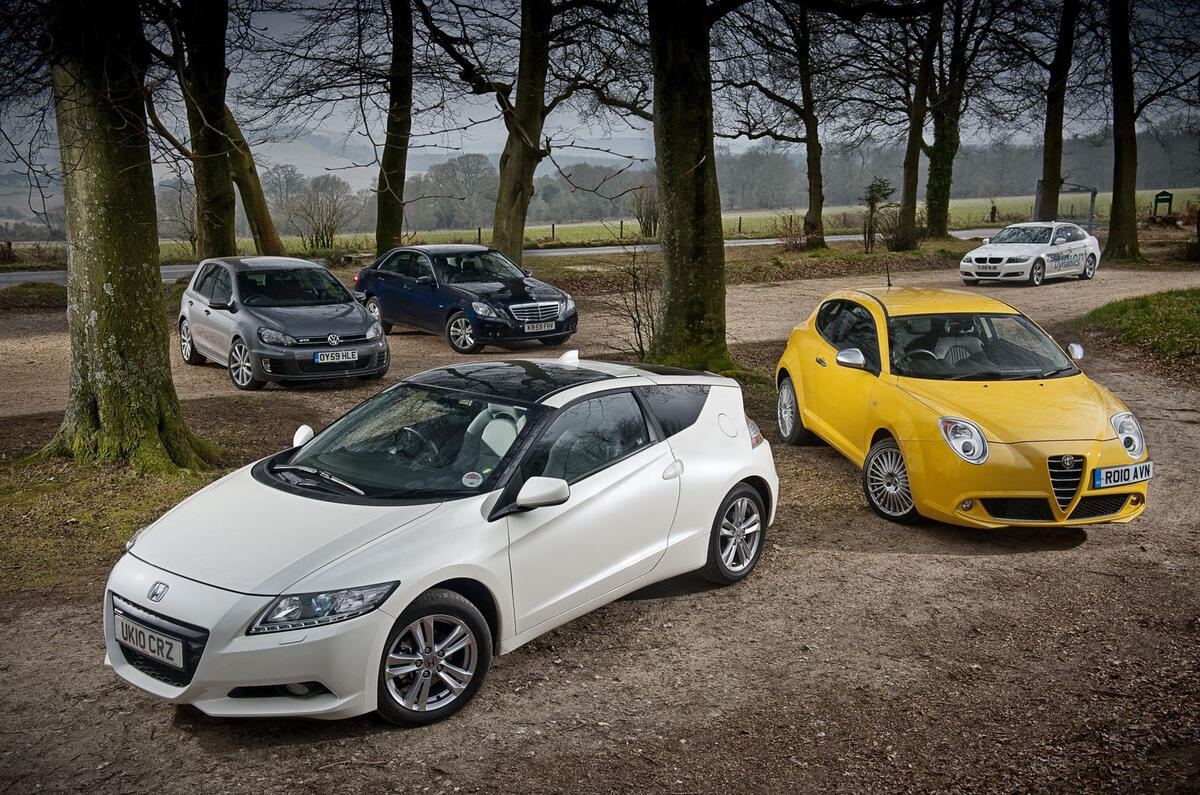The Alfa Mito 1.4 Multiair, BMW 320D Efficient Dynamics, Honda CR-Z, Mercedes E200 CDI Blue Efficiency SE and Volkswagen Golf GTD may seem an odd group of cars.
But they all have some key features in common: 0-60mph in under 10 seconds and average fuel consumption above 50mpg.
See the 50mpg heroes picture special
What makes this fascinating is that the cars' makers have gone about achieving these results in different ways.
The Honda CR-Z is the first sporting hybrid. It's propelled by a 1.5-litre petrol engine that functions in tandem with an electric motor, the two combining to produce 122bhp. Co2 emissions are 117g/km.
BMW's 320d Efficient Dynamics is less technically adventurous, bigger and heavier. Yet the 161bhp diesel scores 109g/km, out-accelerates the Honda and can carry five.
The Mercedes E-class Blue Efficiency produces its 134bhp at a low 2800rpm, and manages 137g/km.
The Golf GTD is perhaps the least radical car here, although its 168bhp 2.0-litre common-rail diesel is one of the best in the business. It hits 139g/km in manual form, but 147g in this DSG version.
Alfa's Mito is also a relatively conventional hot hatch, and has the innovative Multiair engine. Just 1368cc, it produces 133bhp and emits 129g/km of Co2.
In the cars
You sit low in the Honda, and it's spacious up front. But there are restricted views over the shoulder and behind, and the rear seats are useful for luggage only in reality.
The engine's eagerness, the short-throw shift, the sporty driving position and a firm ride all encourage spirited driving, as does the limited roll, plentiful grip and steering that's quicker than the Insight's. The chassis, though, is still disappointingly inert.
On a B-road it is mildly entertaining, even if its performance rarely rises above brisk. The real fun is to be had from its instrumentation, and the miserly games they allow.
The BMW also allows numbers games - albeit via an old-school, needle-swinging econometer. But the real fun comes from the surprisingly strong performance - determined acceleration comes from 280lb ft of torque that overcomes the tall gearing.
The BMW needs pushing hard to bring it alive, but it achieves its pace with civility, the well insulated cabin giving a premium aura that neither the Mito or Honda achieve.
























Join the debate
Add your comment
Re: What's the best 50mpg car?
Re: What's the best 50mpg car?
None of the cars features in this test, that's for sure. The idea of paying £20,000 or more for a car which might achieve 50mpg with the wind behind just doesn't make sense. For even with today's fuel prices, it's depreciation that is the biggest cost for most people owning these cars
So I would respectfully suggest that the best 50 mpg car is something which costs less than £10,000 to buy. Maybe it's the new small Skoda or Kia Picanto?
Re: What's the best 50mpg car?
Surely you are joking?
If are being serious, then you are clearly no motoring enthusiast.
A 118d (for example) is a far, far superior drive and does much less damage to the environment then a Prius, and achieves this with far less complexity (not to mention environmental damage through manufacture).
Anyone who buys a Prius is a person more influnced by trends and fashions than they are by the motivation to be a serious eco-warrior.